2011年《随堂优化训练》英语 新课标北师大版 必修5 unit 15 warm-up & lesson 3 teachers [配套课件]
文档属性
| 名称 | 2011年《随堂优化训练》英语 新课标北师大版 必修5 unit 15 warm-up & lesson 3 teachers [配套课件] |
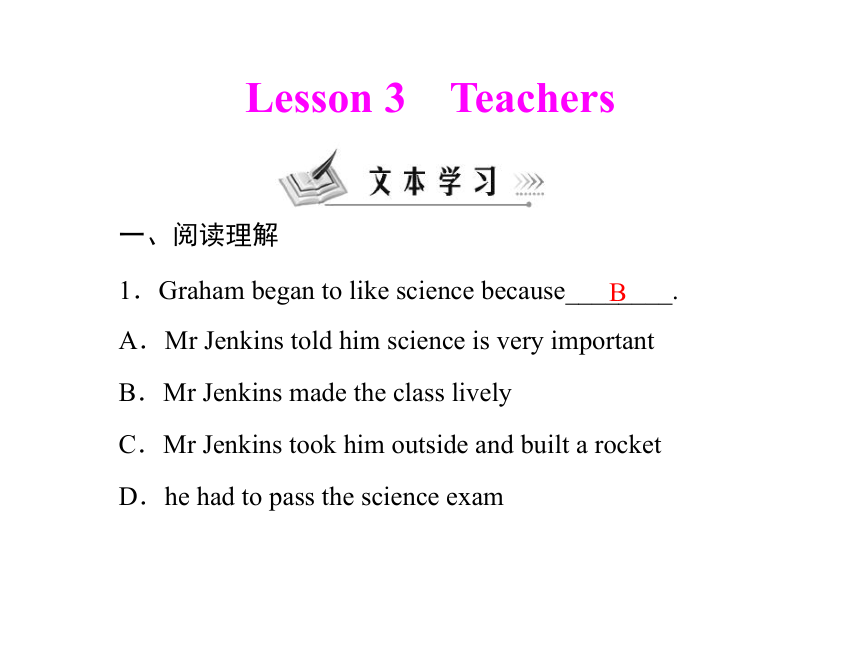
|
|
| 格式 | rar | ||
| 文件大小 | 109.1KB | ||
| 资源类型 | 教案 | ||
| 版本资源 | 北师大版 | ||
| 科目 | 英语 | ||
| 更新时间 | 2011-07-17 00:00:00 | ||
图片预览

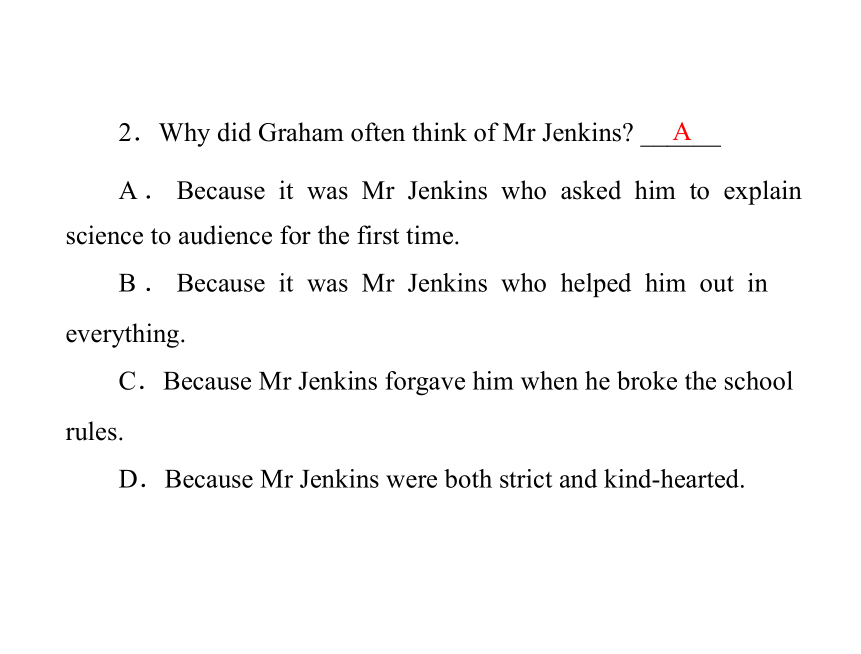
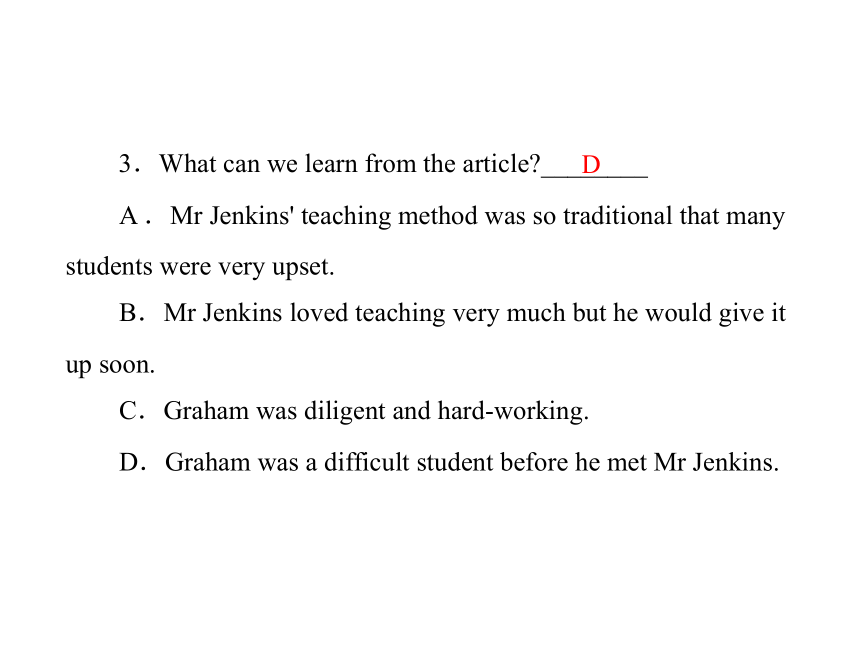
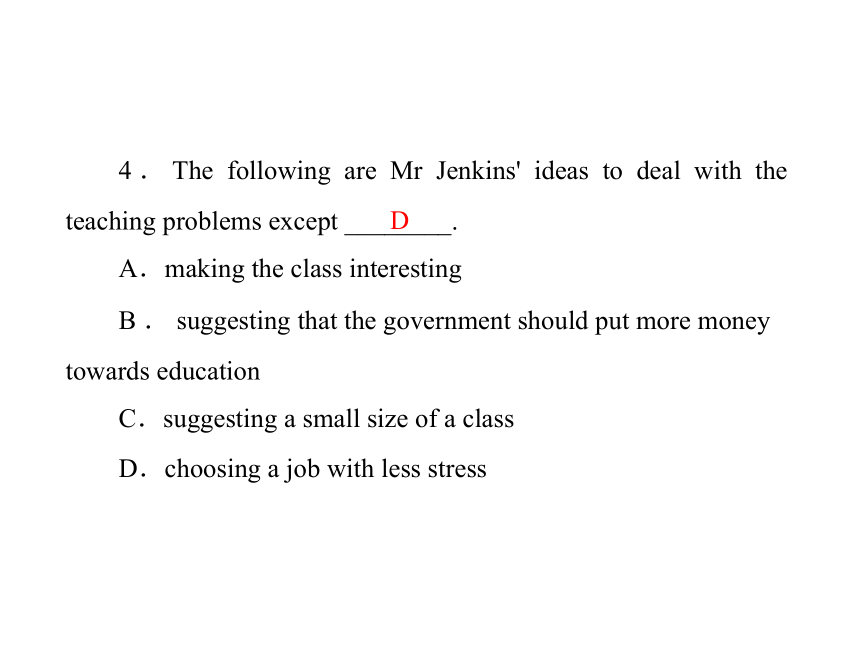
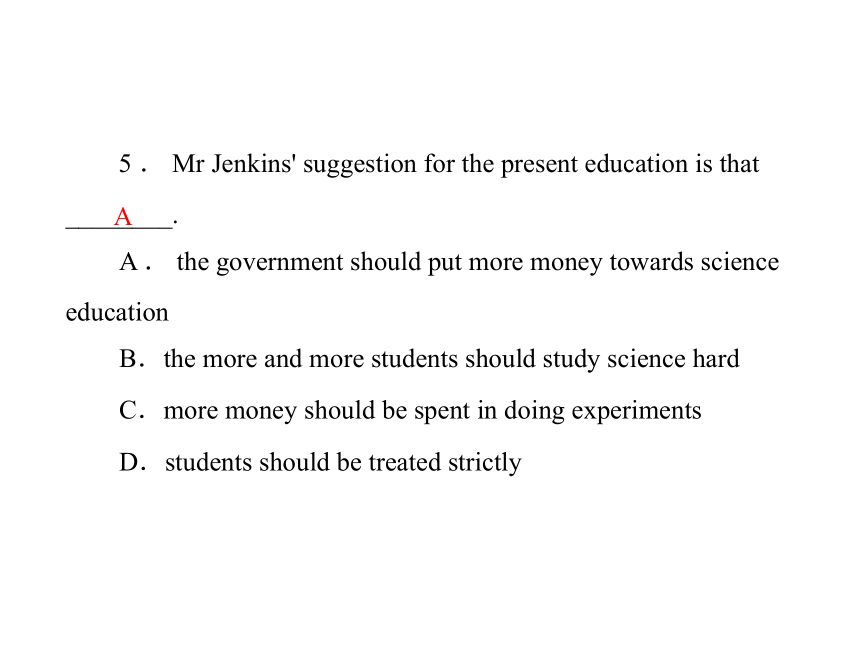

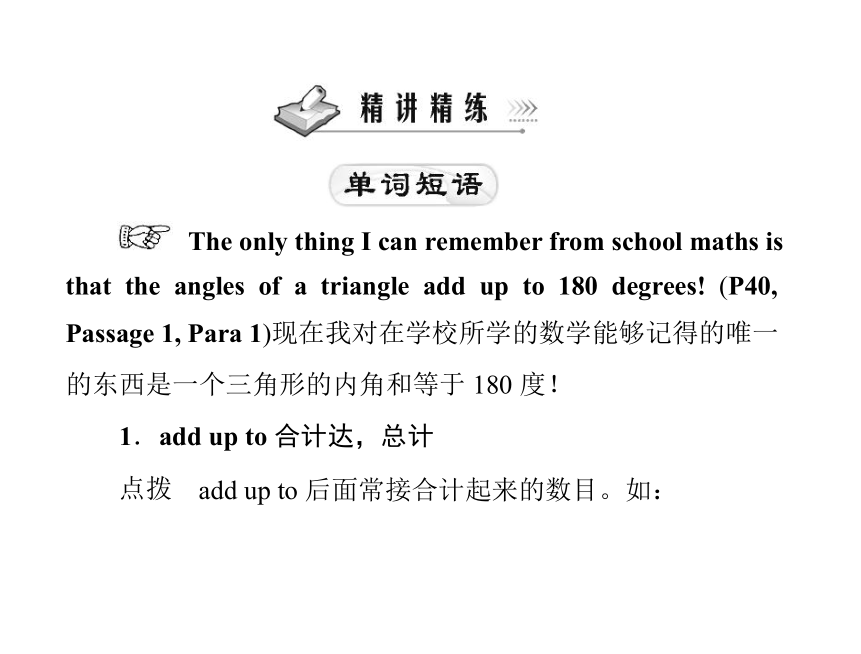
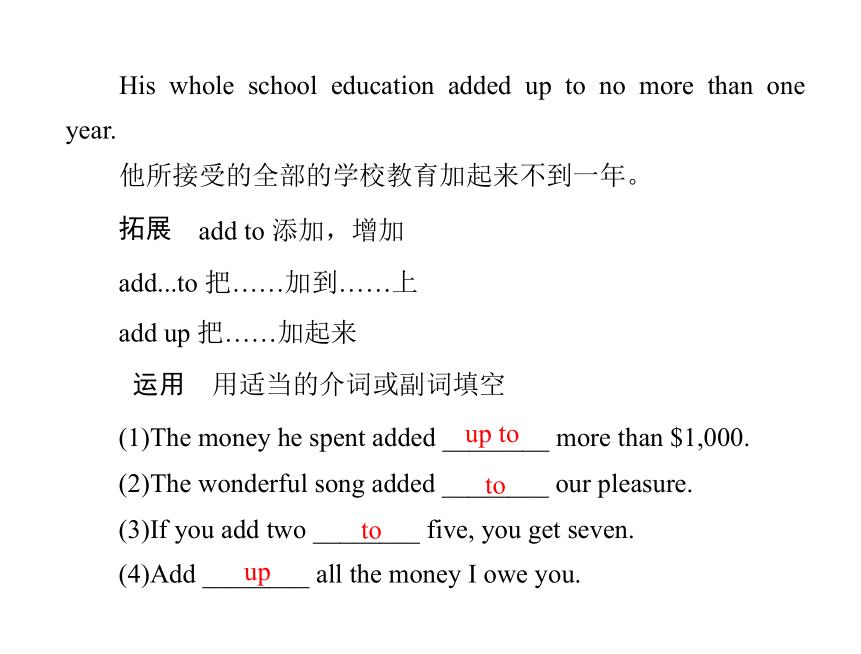
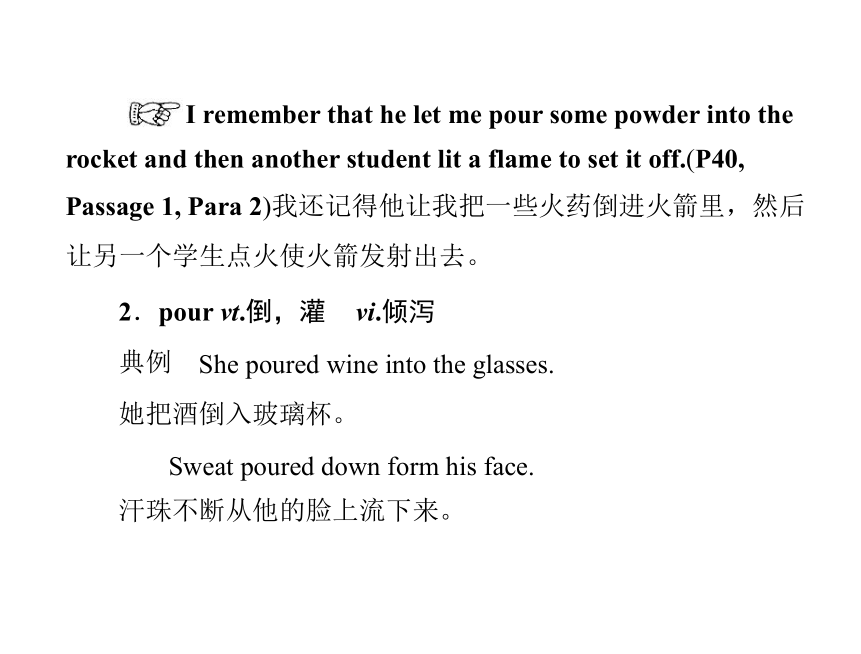
文档简介
(共28张PPT)
Teachers
Lesson 3
一、阅读理解
B
1.Graham began to like science because________.
A.Mr Jenkins told him science is very important
B.Mr Jenkins made the class lively
C.Mr Jenkins took him outside and built a rocket
D.he had to pass the science exam
2.Why did Graham often think of Mr Jenkins ______
A . Because it was Mr Jenkins who asked him to explain
science to audience for the first time.
B . Because it was Mr Jenkins who helped him out in
everything.
C.Because Mr Jenkins forgave him when he broke the school
rules.
D.Because Mr Jenkins were both strict and kind-hearted.
A
3.What can we learn from the article ________
D
A .Mr Jenkins' teaching method was so traditional that many
students were very upset.
B.Mr Jenkins loved teaching very much but he would give it
up soon.
C.Graham was diligent and hard-working.
D.Graham was a difficult student before he met Mr Jenkins.
4 . The following are Mr Jenkins' ideas to deal with the
teaching problems except ________.
A.making the class interesting
B . suggesting that the government should put more money
towards education
C.suggesting a small size of a class
D.choosing a job with less stress
D
5 . Mr Jenkins' suggestion for the present education is that
________.
A
A . the government should put more money towards science
education
B.the more and more students should study science hard
C.more money should be spent in doing experiments
D.students should be treated strictly
二、概括课文大意(30 词左右)
格雷厄姆曾经是一个问题学生。但是在遇到了讲课妙趣横
生的自然科学老师詹金斯先生后,他变得对科学很有兴趣,现
在是一位很成功的自然科学作家。
【答案】
Graham was once a difficult student.But after he met Mr
Jenkins, his science teacher, who can make class very interesting,
he became interested in science and now he is a successful science
author.
The only thing I can remember from school maths is
that the angles of a triangle add up to 180 degrees! (P40,
Passage 1, Para 1)现在我对在学校所学的数学能够记得的唯一
的东西是一个三角形的内角和等于 180 度!
1.add up to 合计达,总计
点拨
add up to 后面常接合计起来的数目。如:
His whole school education added up to no more than one
year.
他所接受的全部的学校教育加起来不到一年。
拓展
add to 添加,增加
add...to 把……加到……上
add up 把……加起来
运用
用适当的介词或副词填空
up to
(1)The money he spent added ________ more than $1,000.
(2)The wonderful song added ________ our pleasure.
to
to
(3)If you add two ________ five, you get seven.
(4)Add ________ all the money I owe you.
up
I remember that he let me pour some powder into the
rocket and then another student lit a flame to set it off.(P40,
Passage 1, Para 2)我还记得他让我把一些火药倒进火箭里,然后
让另一个学生点火使火箭发射出去。
2.pour vt.倒,灌
vi.倾泻
典例
She poured wine into the glasses.
她把酒倒入玻璃杯。
Sweat poured down form his face.
汗珠不断从他的脸上流下来。
拓展
pour into 涌入
poured herself
pour out 倾诉,倾吐
poured into
运用
完成句子
poured out
(1)She ________________ (为自己倒了) a cup of tea.
(2)The crowd ________________ (涌入) the concert hall.
(3)She ________________ (诉说) her worries to the doctor.
3.set off 引发;出发
典例
On this day we set off fireworks in many places.
很多地方在这一天都燃放烟花。
We set off for London just after ten.
刚过十点,我们就动身去了伦敦。
拓展
set out 启程;陈述
set free 释放
set fire to 点燃
set an example 树立榜样
set up 建立
set about 开始;着手
运用
用 set 构成的短语的适当形式填空
(1)It is difficult for us to ____________ a school within a
month.
set up
(2)Having said goodbye to their friends, they ____________
for home.
set off/out
set out
(3)He ___________ the reason for his decision in his report.
(4)I accidentally pressed the button and ____________ the
alarm clock.
set off
set about
(5)We ____________ our task at once with great enthusiasm.
...but it was probably because I lacked confidence in
myself.(P40, Passage 1, Para 3)……但那也许是因为我太缺乏自
信了。
4.lack vt.缺乏,没有
n.[U]缺乏,不足
典例
He lacks common sense.他缺乏常识。
The plants died for lack of water.
那些植物因缺水而枯死了。
拓展
运用
lack of 缺乏
完成句子
(1)I don't ________________ (什么也不缺).
(2)He can not buy it because of his ______________ (缺钱).
lack anything
lack of money
The thing about being a teacher is that you have
access to children's minds when they are open and eager to
learn.(P40, Passage 2, Para 3)作为老师,你可以在孩子们心灵顿
开、渴望学习时进入他们的思想。
5.access n.接近或进入之路
点拨
(1)access 后常接介词 to。如:
The only access to that ancient castle is along a muddy track.
到那座古堡去的唯一通道是一条泥泞小路。
(2)access 还可意为“接近的机会;享有的权利”。如:
Only high officials had access to the president.
只有高级官员才可以接近总统。
拓展
运用
have/gain access to 可以获得/接近……
完成句子
(1)The only ________________ ( 通 路 ) the farmhouse is
across the fields.
access to
(2)Many divorced fathers only ________________ (有权接近)
their children at weekends.
have access to
6.worthwhile adj.值得努力的
点拨
worthwhile 常 作 表 语 , 用 于 句 型 “it is worthwhile
doing/to do sth.”中,意为“值得做某事”。如:
I don't think it is worthwhile to explain/explaining to him.He
simply can't understand us.
我觉得不值得跟他解释,他根本就无法理解我们。
And if what I do as a teacher can help turn a child
like Graham into such a successful adult, then I know what I'm
doing is worthwhile.(P40, Passage 2, Para 3)如果我作为老师所
做的工作能够帮助一个像格雷厄姆这样的孩子成为如此成功的
一个成年人,那么我知道我做的一切都是值得的。
Nursing is a very worthwhile career.
护理是很值得干的职业。(定语)
The visit to Paris is worthwhile.
去巴黎访问是值得的。(表语)
辨析
worthwhile/worthy/worth
(1)worthwhile 表示“值得的,值得努力的,值得花时间/金
钱/精力的”,在句中一般作定语、表语或宾补,常用于句型“It
is worthwhile doing/to do sth.”。如:
(3)worth 表示“值,值得”,可作表语或后置定语,其后接
名词或动名词(表被动含义)作宾语,不接不定式。表示“很/非
常值得”时,worth 用 well 修饰。如:
The book is worth $100.这本书值 100 美元。
The book is well worth reading.这本书很值得看。
(2)worthy 表示“应得,配得上,值得”,常作表语或后置
定语,后接不定式或“of+名词或动名词”。如:
His behavior is worthy of great praise.
他的行为应受到高度赞扬。
The book is worthy of being read.
=The book is worthy to be read.这本书值得读。
1 .The first day he walked into my class, he was dragging
his school bag behind him and looking bored, but as soon as I
set up an experiment to show how the human stomach works
using acid and an onion, he gave me his full attention.(P40,
Passage 2, Para 1)他第一天走进我的课室,他看起来很烦闷,书
包拖在身后,但是我一开始用洋葱和酸做实验展示人类的胃是
怎样工作的时候,他马上就聚精会神地听我讲课。
运用
用上面所提供的辨析词填空
(1)It is __________ to visit Beijing.
(2)One who does his duty is ________ of praising.
(3)The exhibition is ________ a visit.
worthwhile
worthy
worth
点拨
本句是由 but 连接的并列复合句。 前一个分句中,
“he was dragging his school bag behind him and looking bored” 是
主句, “The first day he walked into my class”是时间状语从句;
后一个分句中,“he gave me his full attention”是主句, as soon as
引导时间状语从句,从句中又含有一个由 how 引导的宾语从句。
拓展
在英语中,the instant/the moment/the minute/the hour/
the day/the years 等名词短语可以用来引导时间状语从句,相当
于从属连词。如:
I recognized her the moment I saw her.
我一见到她就认出了她。
运用
完成句子
(1)I knew we would be good friends________________ (第一
次) I met her.
(2)I recognized her ________________ (那一刻) she came in.
the first time
the instant/moment
2 .And if what I do as a teacher can help turn a child like
Graham into such a successful adult, then I know what I'm
doing is worthwhile.(P40, Passage 2, Para 3)如果我作为老师所
做的工作能够帮助一个像格雷厄姆这样的孩子成为如此成功的
一个成年人,那么我知道我做的一切都是值得的。
点拨
本句是一个复合句。And 表示承接上下文;“if...adult”
是条件状语从句,其主语是“what I do as a teacher”, 谓语是“can
doing is worthwhile”这个主系表结
help turn... into...”;“what I'm
构作 know 的宾语。
运用
完成句子
He said ________________ ( 他 所 能 做 的 ) as a doctor
______________________________ (就是挽救病人的生命).
what he could do
was (to) save the lives of the patients
1.精彩文段采撷
It's difficult teaching nowadays.There are lots of problems and
not enough money.The government should have put more money
towards science education.And I wish they would decrease the size
of classes—it's not easy doing lessons in laboratories with big
groups and it must be even worse in the poorer schools! At least
with schools like ours, we have laboratories!如今教书不那么容易
了,有许多问题,经费紧张。政府应该给自然科学的教育多拨
些款。我还希望他们能减少班级的人数——在实验室上课时,
小组人数过多不太好操作。比较穷的学校里情况一定更差!至
少在像我们这样的学校里,我们有实验室!
2.解析
主题句:It's difficult teaching nowadays.
拓 展 句 1 : There are lots of problems and not enough
money.(说明主题句)
次要拓展句:The government should have put more money
towards science education.(进一步说明拓展句)
拓 展 句 2 : And I wish they would decrease the size of
classes—it's not easy doing lessons in laboratories with big groups
and it must be even worse in the poorer schools!(说明主题句)
次 要 拓 展 句 : At least with schools like ours, we have
laboratories!(进一步说明拓展句)
3.仿写
原作文材料
主题句:我选择乘火车旅行有三个理由。
拓展句 1:理由之一“安全”。
拓展句 2:理由之二“经济”。
拓展句 3:理由之三“舒适”。
拓展
主题句:我选择乘火车旅行有三个理由。
拓展句 1:理由之一“安全”,(次要拓展句)很少听说火车
翻车越轨;同时火车很少受天气的影响。
拓展句 2:理由之二“经济”,(次要拓展句)火车车费比飞
机便宜,比公交车要节省时间。
拓展句 3:理由之三“舒适”,(次要拓展句)火车比较宽敞,
沿路可以观赏窗处美丽的风景。
reasons.Firstly,
traveling
by
train
is
the
safest
way
of
Seldom have we heard of train accident because train
runs on tracks and is hardly affected by weather.Secondly, it is very
economic to travel by train.Train ticket won't cost so much as that
of air flight, and traveling by train saves much more time than
sitting in a bus.Finally, it is comfortable to sit in a train which is
spacious and offers a good view of the landscape outside the
window.
【参考范文】
My choice of traveling by train is based on the following three
transportation.
所发生事情 宾语从句谓语动词形式
与将来事实情况相反 would/could/might+动词原形
与现在事实情况相反 did/were
与过去事实情况相反 had done
wish 与 should have done 的用法
一、wish 宾语从句中的虚拟语气
如:
She wishes she had more money.
她真希望有更多的钱。
I wish you had come to the lecture.
但愿你当时听了报告。
I wish I could fly to the moon some day.
如果有一天我能飞到月球上就好了。
二、should have done 的用法
表示强烈的责备, 意为“本应该……,结果……”。如:
You should have told me earlier that you weren't able to come.
你本应该早点儿告诉我你不能来的。
You shouldn't have failed this time.
你这次不应该不及格的。
完成句子
1.I wish ________________ (我知晓一切) in the world.
2.We wish we ________________ (有翅膀).
3.I wish that I ________________ (和你一起去了) last night.
4.I wish that some day people ___________________ (可以生活
在月球上).
5.I wish it ___________ (是春天) all the year round.
6.—I'll tell Mary about her new job tomorrow.
—You ________________ (本应该告诉她) last week.
I knew everything
had wings
had gone with you
could live on the moon
were spring
should have told her
Teachers
Lesson 3
一、阅读理解
B
1.Graham began to like science because________.
A.Mr Jenkins told him science is very important
B.Mr Jenkins made the class lively
C.Mr Jenkins took him outside and built a rocket
D.he had to pass the science exam
2.Why did Graham often think of Mr Jenkins ______
A . Because it was Mr Jenkins who asked him to explain
science to audience for the first time.
B . Because it was Mr Jenkins who helped him out in
everything.
C.Because Mr Jenkins forgave him when he broke the school
rules.
D.Because Mr Jenkins were both strict and kind-hearted.
A
3.What can we learn from the article ________
D
A .Mr Jenkins' teaching method was so traditional that many
students were very upset.
B.Mr Jenkins loved teaching very much but he would give it
up soon.
C.Graham was diligent and hard-working.
D.Graham was a difficult student before he met Mr Jenkins.
4 . The following are Mr Jenkins' ideas to deal with the
teaching problems except ________.
A.making the class interesting
B . suggesting that the government should put more money
towards education
C.suggesting a small size of a class
D.choosing a job with less stress
D
5 . Mr Jenkins' suggestion for the present education is that
________.
A
A . the government should put more money towards science
education
B.the more and more students should study science hard
C.more money should be spent in doing experiments
D.students should be treated strictly
二、概括课文大意(30 词左右)
格雷厄姆曾经是一个问题学生。但是在遇到了讲课妙趣横
生的自然科学老师詹金斯先生后,他变得对科学很有兴趣,现
在是一位很成功的自然科学作家。
【答案】
Graham was once a difficult student.But after he met Mr
Jenkins, his science teacher, who can make class very interesting,
he became interested in science and now he is a successful science
author.
The only thing I can remember from school maths is
that the angles of a triangle add up to 180 degrees! (P40,
Passage 1, Para 1)现在我对在学校所学的数学能够记得的唯一
的东西是一个三角形的内角和等于 180 度!
1.add up to 合计达,总计
点拨
add up to 后面常接合计起来的数目。如:
His whole school education added up to no more than one
year.
他所接受的全部的学校教育加起来不到一年。
拓展
add to 添加,增加
add...to 把……加到……上
add up 把……加起来
运用
用适当的介词或副词填空
up to
(1)The money he spent added ________ more than $1,000.
(2)The wonderful song added ________ our pleasure.
to
to
(3)If you add two ________ five, you get seven.
(4)Add ________ all the money I owe you.
up
I remember that he let me pour some powder into the
rocket and then another student lit a flame to set it off.(P40,
Passage 1, Para 2)我还记得他让我把一些火药倒进火箭里,然后
让另一个学生点火使火箭发射出去。
2.pour vt.倒,灌
vi.倾泻
典例
She poured wine into the glasses.
她把酒倒入玻璃杯。
Sweat poured down form his face.
汗珠不断从他的脸上流下来。
拓展
pour into 涌入
poured herself
pour out 倾诉,倾吐
poured into
运用
完成句子
poured out
(1)She ________________ (为自己倒了) a cup of tea.
(2)The crowd ________________ (涌入) the concert hall.
(3)She ________________ (诉说) her worries to the doctor.
3.set off 引发;出发
典例
On this day we set off fireworks in many places.
很多地方在这一天都燃放烟花。
We set off for London just after ten.
刚过十点,我们就动身去了伦敦。
拓展
set out 启程;陈述
set free 释放
set fire to 点燃
set an example 树立榜样
set up 建立
set about 开始;着手
运用
用 set 构成的短语的适当形式填空
(1)It is difficult for us to ____________ a school within a
month.
set up
(2)Having said goodbye to their friends, they ____________
for home.
set off/out
set out
(3)He ___________ the reason for his decision in his report.
(4)I accidentally pressed the button and ____________ the
alarm clock.
set off
set about
(5)We ____________ our task at once with great enthusiasm.
...but it was probably because I lacked confidence in
myself.(P40, Passage 1, Para 3)……但那也许是因为我太缺乏自
信了。
4.lack vt.缺乏,没有
n.[U]缺乏,不足
典例
He lacks common sense.他缺乏常识。
The plants died for lack of water.
那些植物因缺水而枯死了。
拓展
运用
lack of 缺乏
完成句子
(1)I don't ________________ (什么也不缺).
(2)He can not buy it because of his ______________ (缺钱).
lack anything
lack of money
The thing about being a teacher is that you have
access to children's minds when they are open and eager to
learn.(P40, Passage 2, Para 3)作为老师,你可以在孩子们心灵顿
开、渴望学习时进入他们的思想。
5.access n.接近或进入之路
点拨
(1)access 后常接介词 to。如:
The only access to that ancient castle is along a muddy track.
到那座古堡去的唯一通道是一条泥泞小路。
(2)access 还可意为“接近的机会;享有的权利”。如:
Only high officials had access to the president.
只有高级官员才可以接近总统。
拓展
运用
have/gain access to 可以获得/接近……
完成句子
(1)The only ________________ ( 通 路 ) the farmhouse is
across the fields.
access to
(2)Many divorced fathers only ________________ (有权接近)
their children at weekends.
have access to
6.worthwhile adj.值得努力的
点拨
worthwhile 常 作 表 语 , 用 于 句 型 “it is worthwhile
doing/to do sth.”中,意为“值得做某事”。如:
I don't think it is worthwhile to explain/explaining to him.He
simply can't understand us.
我觉得不值得跟他解释,他根本就无法理解我们。
And if what I do as a teacher can help turn a child
like Graham into such a successful adult, then I know what I'm
doing is worthwhile.(P40, Passage 2, Para 3)如果我作为老师所
做的工作能够帮助一个像格雷厄姆这样的孩子成为如此成功的
一个成年人,那么我知道我做的一切都是值得的。
Nursing is a very worthwhile career.
护理是很值得干的职业。(定语)
The visit to Paris is worthwhile.
去巴黎访问是值得的。(表语)
辨析
worthwhile/worthy/worth
(1)worthwhile 表示“值得的,值得努力的,值得花时间/金
钱/精力的”,在句中一般作定语、表语或宾补,常用于句型“It
is worthwhile doing/to do sth.”。如:
(3)worth 表示“值,值得”,可作表语或后置定语,其后接
名词或动名词(表被动含义)作宾语,不接不定式。表示“很/非
常值得”时,worth 用 well 修饰。如:
The book is worth $100.这本书值 100 美元。
The book is well worth reading.这本书很值得看。
(2)worthy 表示“应得,配得上,值得”,常作表语或后置
定语,后接不定式或“of+名词或动名词”。如:
His behavior is worthy of great praise.
他的行为应受到高度赞扬。
The book is worthy of being read.
=The book is worthy to be read.这本书值得读。
1 .The first day he walked into my class, he was dragging
his school bag behind him and looking bored, but as soon as I
set up an experiment to show how the human stomach works
using acid and an onion, he gave me his full attention.(P40,
Passage 2, Para 1)他第一天走进我的课室,他看起来很烦闷,书
包拖在身后,但是我一开始用洋葱和酸做实验展示人类的胃是
怎样工作的时候,他马上就聚精会神地听我讲课。
运用
用上面所提供的辨析词填空
(1)It is __________ to visit Beijing.
(2)One who does his duty is ________ of praising.
(3)The exhibition is ________ a visit.
worthwhile
worthy
worth
点拨
本句是由 but 连接的并列复合句。 前一个分句中,
“he was dragging his school bag behind him and looking bored” 是
主句, “The first day he walked into my class”是时间状语从句;
后一个分句中,“he gave me his full attention”是主句, as soon as
引导时间状语从句,从句中又含有一个由 how 引导的宾语从句。
拓展
在英语中,the instant/the moment/the minute/the hour/
the day/the years 等名词短语可以用来引导时间状语从句,相当
于从属连词。如:
I recognized her the moment I saw her.
我一见到她就认出了她。
运用
完成句子
(1)I knew we would be good friends________________ (第一
次) I met her.
(2)I recognized her ________________ (那一刻) she came in.
the first time
the instant/moment
2 .And if what I do as a teacher can help turn a child like
Graham into such a successful adult, then I know what I'm
doing is worthwhile.(P40, Passage 2, Para 3)如果我作为老师所
做的工作能够帮助一个像格雷厄姆这样的孩子成为如此成功的
一个成年人,那么我知道我做的一切都是值得的。
点拨
本句是一个复合句。And 表示承接上下文;“if...adult”
是条件状语从句,其主语是“what I do as a teacher”, 谓语是“can
doing is worthwhile”这个主系表结
help turn... into...”;“what I'm
构作 know 的宾语。
运用
完成句子
He said ________________ ( 他 所 能 做 的 ) as a doctor
______________________________ (就是挽救病人的生命).
what he could do
was (to) save the lives of the patients
1.精彩文段采撷
It's difficult teaching nowadays.There are lots of problems and
not enough money.The government should have put more money
towards science education.And I wish they would decrease the size
of classes—it's not easy doing lessons in laboratories with big
groups and it must be even worse in the poorer schools! At least
with schools like ours, we have laboratories!如今教书不那么容易
了,有许多问题,经费紧张。政府应该给自然科学的教育多拨
些款。我还希望他们能减少班级的人数——在实验室上课时,
小组人数过多不太好操作。比较穷的学校里情况一定更差!至
少在像我们这样的学校里,我们有实验室!
2.解析
主题句:It's difficult teaching nowadays.
拓 展 句 1 : There are lots of problems and not enough
money.(说明主题句)
次要拓展句:The government should have put more money
towards science education.(进一步说明拓展句)
拓 展 句 2 : And I wish they would decrease the size of
classes—it's not easy doing lessons in laboratories with big groups
and it must be even worse in the poorer schools!(说明主题句)
次 要 拓 展 句 : At least with schools like ours, we have
laboratories!(进一步说明拓展句)
3.仿写
原作文材料
主题句:我选择乘火车旅行有三个理由。
拓展句 1:理由之一“安全”。
拓展句 2:理由之二“经济”。
拓展句 3:理由之三“舒适”。
拓展
主题句:我选择乘火车旅行有三个理由。
拓展句 1:理由之一“安全”,(次要拓展句)很少听说火车
翻车越轨;同时火车很少受天气的影响。
拓展句 2:理由之二“经济”,(次要拓展句)火车车费比飞
机便宜,比公交车要节省时间。
拓展句 3:理由之三“舒适”,(次要拓展句)火车比较宽敞,
沿路可以观赏窗处美丽的风景。
reasons.Firstly,
traveling
by
train
is
the
safest
way
of
Seldom have we heard of train accident because train
runs on tracks and is hardly affected by weather.Secondly, it is very
economic to travel by train.Train ticket won't cost so much as that
of air flight, and traveling by train saves much more time than
sitting in a bus.Finally, it is comfortable to sit in a train which is
spacious and offers a good view of the landscape outside the
window.
【参考范文】
My choice of traveling by train is based on the following three
transportation.
所发生事情 宾语从句谓语动词形式
与将来事实情况相反 would/could/might+动词原形
与现在事实情况相反 did/were
与过去事实情况相反 had done
wish 与 should have done 的用法
一、wish 宾语从句中的虚拟语气
如:
She wishes she had more money.
她真希望有更多的钱。
I wish you had come to the lecture.
但愿你当时听了报告。
I wish I could fly to the moon some day.
如果有一天我能飞到月球上就好了。
二、should have done 的用法
表示强烈的责备, 意为“本应该……,结果……”。如:
You should have told me earlier that you weren't able to come.
你本应该早点儿告诉我你不能来的。
You shouldn't have failed this time.
你这次不应该不及格的。
完成句子
1.I wish ________________ (我知晓一切) in the world.
2.We wish we ________________ (有翅膀).
3.I wish that I ________________ (和你一起去了) last night.
4.I wish that some day people ___________________ (可以生活
在月球上).
5.I wish it ___________ (是春天) all the year round.
6.—I'll tell Mary about her new job tomorrow.
—You ________________ (本应该告诉她) last week.
I knew everything
had wings
had gone with you
could live on the moon
were spring
should have told her
